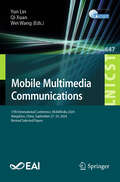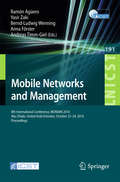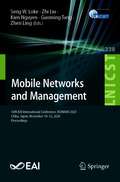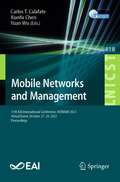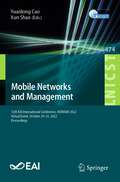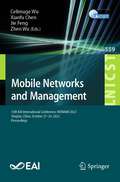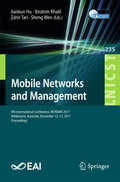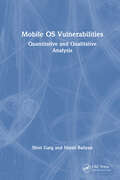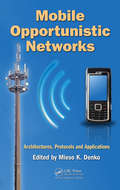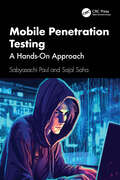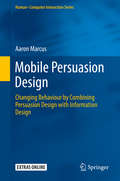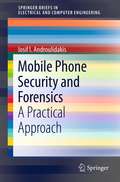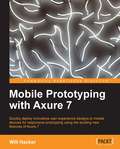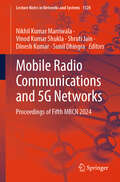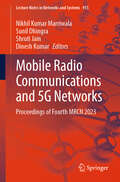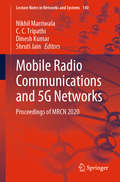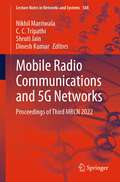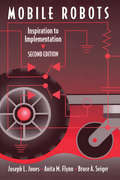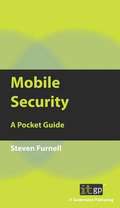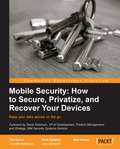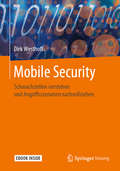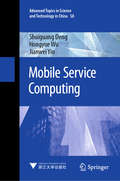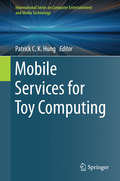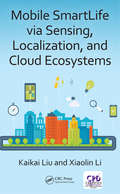- Table View
- List View
Mobile Multimedia Communications: 17th International Conference, MobiMedia 2024, Hangzhou, China, September 27–29, 2024, Revised Selected Papers (Lecture Notes of the Institute for Computer Sciences, Social Informatics and Telecommunications Engineering #647)
by Wei Wang Yun Lin Qi XuanThis proceedings constitutes the revised selected papers of the 17th International Conference on Mobile Multimedia Communications, MOBIMEDIA 2024, held in Hangzhou, China, during September 27–29, 2024. The 8 full papers were included in this book were carefully reviewed and selected from 120 submissions. They focus on 5G communication technologies, multimedia services and applications, AI Inspired Future Technologies.
Mobile Networks and Management
by Anna Förster Ramón Agüero Bernd-Ludwig Wenning Andreas Timm-Giel Yasir ZakiThis book constitutes the post-proceedings of the 5th International ICST Conference on Mobile Networks and Management, MONAMI 2013, held in Cork, Ireland, in September 2013. The 18 revised full papers presented were carefully reviewed and selected from numerous submissions. The volume is organized thematically in five parts, covering: TCP, multi-path and coding and content-centric networking; mobile networks; wireless sensor and vehicular networks; wireless communications and traffic; future research directions, including cloud connectivity, orchestration and SDN.
Mobile Networks and Management: 10th EAI International Conference, MONAMI 2020, Chiba, Japan, November 10–12, 2020, Proceedings (Lecture Notes of the Institute for Computer Sciences, Social Informatics and Telecommunications Engineering #338)
by Kien Nguyen Seng W. Loke Zhi Liu Guoming Tang Zhen LingThis book constitutes the refereed post-conference proceedings of the 10th International Conference on Mobile Networks and Management, MONAMI 2020, held in Chiba, Japan, in November 2020. The conference was held virtually due to the COVID-19 pandemic.The 19 full papers were carefully reviewed and selected from 41 submissions. The papers are divided into groups of content as follows: Application of artificial intelligence for smart city; Advanced technology in edge computing; Recent advances in mobile communications and computing; Emerging technologies and applications in mobile networks and management.
Mobile Networks and Management: 11th EAI International Conference, MONAMI 2021, Virtual Event, October 27-29, 2021, Proceedings (Lecture Notes of the Institute for Computer Sciences, Social Informatics and Telecommunications Engineering #418)
by Yuan Wu Carlos T. Calafate Xianfu ChenThis book constitutes the refereed post-conference proceedings of the 11th International Conference on Mobile Networks and Management, MONAMI 2021, held in October 2021. The conference was held virtually due to the COVID-19 pandemic. The 26 full papers were carefully reviewed and selected from 53 submissions. The papers are divided into groups of content as follows: The application of artificial intelligence for smart city; Advanced technology in edge and fog computing; Emerging technologies and applications in mobile networks and management; and Recent advances in communications and computing.
Mobile Networks and Management: 12th EAI International Conference, MONAMI 2022, Virtual Event, October 29-31, 2022, Proceedings (Lecture Notes of the Institute for Computer Sciences, Social Informatics and Telecommunications Engineering #474)
by Yuanlong Cao Xun ShaoThis book constitutes the refereed post-conference proceedings of the 12th EAI International Conference on Mobile Networks and Management, MONAMI 2022, which took place virtually during October 29-31, 2022.The 31 full papers were carefully reviewed and selected from 78 submissions. The papers are divided into groups of content as follows: Innovative Artificial Intelligence Applications for Smart City; The New Era of Computer Network by using Machine Learning; Advanced Technologies in Edge and Fog Computing; Emerging Technologies in Mobile Networks and Management; and Recent Advances in Communications and Computing.
Mobile Networks and Management: 13th EAI International Conference, MONAMI 2023, Yingtan, China, October 27-29, 2023, Proceedings (Lecture Notes of the Institute for Computer Sciences, Social Informatics and Telecommunications Engineering #559)
by Jie Feng Zhen Wu Xianfu Chen Celimuge WuThis book constitutes the refereed post-conference proceedings of the 13th International Conference on Mobile Networks and Management, MONAMI 2023, held in Yingtan, China, in October 2023. The 21 full papers were carefully reviewed and selected from 41 submissions. The papers are divided into groups of content as follows: Wireless Communication and Networks; Network Security and Blockchain; Image Processing and Computer Vision; Distributed Computing; Emerging Applications.
Mobile Networks and Management: 9th International Conference, Monami 2017, Melbourne, Australia, December 13-15, 2017, Proceedings (Lecture Notes of the Institute for Computer Sciences, Social Informatics and Telecommunications Engineering #235)
by Sheng Wen Jiankun Hu Ibrahim Khalil Zahir TariThis book constitutes the refereed post-conference proceedings of the 9th International Conference on Mobile Networks and Management, MONAMI 2017, held in Melbourne, Australia, in December 2017. The 30 revised full papers were carefully reviewed and selected from 43 submissions. The papers handle topics in the area of mobile computing, wireless networking and management.
Mobile OS Vulnerabilities: Quantitative and Qualitative Analysis
by Niyati Baliyan Shivi GargThis is book offers in-depth analysis of security vulnerabilities in different mobile operating systems. It provides methodology and solutions for handling Android malware and vulnerabilities and transfers the latest knowledge in machine learning and deep learning models towards this end. Further, it presents a comprehensive analysis of software vulnerabilities based on different technical parameters such as causes, severity, techniques, and software systems’ type. Moreover, the book also presents the current state of the art in the domain of software threats and vulnerabilities. This would help analyze various threats that a system could face, and subsequently, it could guide the securityengineer to take proactive and cost-effective countermeasures. Security threats are escalating exponentially, thus posing a serious challenge to mobile platforms. Android and iOS are prominent due to their enhanced capabilities and popularity among users. Therefore, it is important to compare these two mobile platforms based on security aspects. Android proved to be more vulnerable compared to iOS. The malicious apps can cause severe repercussions such as privacy leaks, app crashes, financial losses (caused by malware triggered premium rate SMSs), arbitrary code installation, etc. Hence, Android security is a major concern amongst researchers as seen in the last few years. This book provides an exhaustive review of all the existing approaches in a structured format. The book also focuses on the detection of malicious applications that compromise users' security and privacy, the detection performance of the different program analysis approach, and the influence of different input generators during static and dynamic analysis on detection performance. This book presents a novel method using an ensemble classifier scheme for detecting malicious applications, which is less susceptible to the evolution of the Android ecosystem and malware compared to previous methods. The book also introduces an ensemble multi-class classifier scheme to classify malware into known families. Furthermore, we propose a novel framework of mapping malware to vulnerabilities exploited using Android malware’s behavior reports leveraging pre-trained language models and deep learning techniques. The mapped vulnerabilities can then be assessed on confidentiality, integrity, and availability on different Android components and sub-systems, and different layers.
Mobile Opportunistic Networks: Architectures, Protocols and Applications
by Mieso K. DenkoFrom fundamentals to advanced concepts, this book provides comprehensive technical coverage of this rapidly emerging communications technology. The first section focuses on modeling, networking architecture, and routing problems. The second section examines opportunistic networking technologies and applications. Supplying detailed discussions of key research challenges and open issues, this comprehensive resource provides a clear understanding of industrial and professional standards, communication architectures, network algorithms and protocols, emerging applications, and the latest experimental studies-including simulation tools and implementation test beds.
Mobile Penetration Testing: A Hands-On Approach
by Sajal Saha Sabyasachi PaulAs mobile applications become prime targets for cyber threats, Mobile Penetration Testing – A Hands-On Approach provides a comprehensive, practical guide to assessing and securing Android applications. This book follows industry-standard methodologies, covering key topics such as Android architecture, OWASP Mobile Top 10, reversing, traffic interception, and real-world hacking scenarios.Through step-by-step walkthroughs, case studies, and hands-on exercises, readers will learn to identify and exploit vulnerabilities effectively. The book is suitable for cybersecurity professionals, students, and enthusiasts, and also serves as a valuable resource for those preparing for certifications like eMAPT and GMOB. If you're a beginner, this guide equips you with the skills needed to perform mobile penetration testing in real-world environments.
Mobile Persuasion Design
by Aaron MarcusMobile Persuasion Design presents ten conceptual design projects (or 'Machines') for new mobile application's (smartphone or tablet with Web portals) that combine theories of persuasion and information design to change people's behaviour. Areas such as the environment, health, learning and happiness are explored, looking at ways of marrying people's wants and needs to make simple, usable and desirable mobile applications. A user-centred design approach has been used, adopting user experience (UX) methods, in-depth case studies and market analysis to see what a modern user needs from their mobile application. By applying concepts like persuasion theory and information architecture, try to find ways to satisfy these needs and positively change their user habits. In 2011, the Green, Health, and Money Machines won design awards in an international competition hosted by the International Institute for Information Design, Vienna.
Mobile Persuasion: 20 Perspectives on the Future of Behavior Change
by B. J. FoggThe mobile phone will soon become the most powerful channel for persuasion. This book presents 20 perspectives on how mobile devices can be designed to motivate and influence people - and how this emerging trend will change the way you live, work, and play.
Mobile Phone Security and Forensics
by I. I. AndroulidakisMobile Phone Security and Forensics provides both theoretical and practical background of security and forensics for mobile phones. The author discusses confidentiality, integrity, and availability threats in mobile telephones to provide background for the rest of the book. Security and secrets of mobile phones are discussed including software and hardware interception, fraud and other malicious techniques used "against" users. The purpose of this book is to raise user awareness in regards to security and privacy threats present in the use of mobile phones while readers will also learn where forensics data reside in the mobile phone and the network and how to conduct a relevant analysis.
Mobile Prototyping with Axure 7
by Will HackerThis book is a step-by-step tutorial which includes hands-on examples and downloadable Axure files to get you started with mobile prototyping immediately. You will learn how to develop an application from scratch, and will be guided through each and every step.If you are a mobile-centric developer/designer, or someone who would like to take their Axure prototyping skills to the next level and start designing and testing mobile prototypes, this book is ideal for you. You should be familiar with prototyping and Axure specifically, before you read this book.
Mobile Radio Communications and 5G Networks: Proceedings of Fifth MRCN 2024 (Lecture Notes in Networks and Systems #1328)
by Dinesh Kumar Shruti Jain Vinod Kumar Shukla Nikhil Kumar Marriwala Sunil DhingraThis book features selected high-quality papers from the Fourth International Conference on Mobile Radio Communications and 5G Networks (MRCN 2024), held at University Institute of Engineering and Technology, Kurukshetra University, Kurukshetra, India, during 25 - 26 August 2024. The book features original papers by active researchers presented at the International Conference on Mobile Radio Communications and 5G Networks. It includes recent advances and upcoming technologies in the field of cellular systems, 2G/2.5G/3G/4G/5G, and beyond, LTE, WiMAX, WMAN, and other emerging broadband wireless networks, WLAN, WPAN, and various home/personal networking technologies, pervasive and wearable computing and networking, small cells and femtocell networks, wireless mesh networks, vehicular wireless networks, cognitive radio networks and their applications, wireless multimedia networks, green wireless networks, standardization of emerging wireless technologies, power management and energy conservation techniques.
Mobile Radio Communications and 5G Networks: Proceedings of Fourth MRCN 2023 (Lecture Notes in Networks and Systems #915)
by Dinesh Kumar Shruti Jain Nikhil Kumar Marriwala Sunil DhingraThis book features selected high-quality papers from the Forth International Conference on Mobile Radio Communications and 5G Networks (MRCN 2023), held at University Institute of Engineering and Technology, Kurukshetra University, Kurukshetra, India, during August 25–26, 2023. The book features original papers by active researchers presented at the International Conference on Mobile Radio Communications and 5G Networks. It includes recent advances and upcoming technologies in the field of cellular systems, 2G/2.5G/3G/4G/5G, and beyond, LTE, WiMAX, WMAN, and other emerging broadband wireless networks, WLAN, WPAN, and various home/personal networking technologies, pervasive and wearable computing and networking, small cells and femtocell networks, wireless mesh networks, vehicular wireless networks, cognitive radio networks and their applications, wireless multimedia networks, green wireless networks, standardization of emerging wireless technologies, power management and energy conservation techniques.
Mobile Radio Communications and 5G Networks: Proceedings of MRCN 2020 (Lecture Notes in Networks and Systems #140)
by Dinesh Kumar Shruti Jain Nikhil Marriwala C. C. TripathiThe book features original papers by active researchers presented at the International Conference on Mobile Radio Communications and 5G Networks. It includes recent advances and upcoming technologies in the field of cellular systems, 2G/2.5G/3G/4G/5G and beyond, LTE, WiMAX, WMAN, and other emerging broadband wireless networks, WLAN, WPAN, and various home/personal networking technologies, pervasive and wearable computing and networking, small cells and femtocell networks, wireless mesh networks, vehicular wireless networks, cognitive radio networks and their applications, wireless multimedia networks, green wireless networks, standardization of emerging wireless technologies, power management and energy conservation techniques.
Mobile Radio Communications and 5G Networks: Proceedings of Third MRCN 2022 (Lecture Notes in Networks and Systems #588)
by Dinesh Kumar Shruti Jain Nikhil Marriwala C. C. TripathiThis book features selected high-quality papers from the Third International Conference on Mobile Radio Communications and 5G Networks (MRCN 2022), held at University Institute of Engineering and Technology, Kurukshetra University, Kurukshetra, India, during June 10–12, 2022. The book features original papers by active researchers presented at the International Conference on Mobile Radio Communications and 5G Networks. It includes recent advances and upcoming technologies in the field of cellular systems, 2G/2.5G/3G/4G/5G, and beyond, LTE, WiMAX, WMAN, and other emerging broadband wireless networks, WLAN, WPAN, and various home/personal networking technologies, pervasive and wearable computing and networking, small cells and femtocell networks, wireless mesh networks, vehicular wireless networks, cognitive radio networks and their applications, wireless multimedia networks, green wireless networks, standardization of emerging wireless technologies, power management and energy conservation techniques.
Mobile Robots: Inspiration to Implementation, Second Edition
by Joseph L. Jones Bruce A. Seiger Anita M. FlynnRevised and updated, the second edition includes several new chapters with projects and applications. The authors keep pace with the ever-growing and rapidly expanding field of robotics. The new edition reflects technological developments and includes programs and activities for robot enthusiasts. Using photographs, illustrations, and informative t
Mobile Security
by Steven FurnellMobile devices represent an increasingly important proportion of the technology market, with laptops, PDAs and smartphones all offering substantial opportunities to improve personal communications and business flexibility. In addition, removable storage, such as memory sticks, now enables enormous quantities of data to be carried around, making it available to use on demand in any location. However, such undoubted advantages can also bring considerable risks, with devices being physically vulnerable to loss, theft and damage, as well as potentially exposed to various forms of electronic attack. As such, there is a significant and growing need for protection, in order to enable us to get the best out of the kit in an otherwise dangerous digital world. The book provides a concise reference to the key security issues affecting those that deploy and use mobile technologies to support their organisations. It aims to raise awareness of the threats to which mobile devices, users and data are exposed, as well as to provide advice on how to address the problems.
Mobile Security: How to Secure, Privatize, and Recover Your Devices
by Joseph Anderson Tim Speed Jaya Nampalli Mari Heiser Darla NykampLearn how to keep yourself safe online with easy- to- follow examples and real- life scenarios. Written by developers at IBM, this guide should be the only resource you need to keep your personal information private.Mobile security is one of the most talked about areas in I.T. today with data being stolen from smartphones and tablets around the world. Make sure you, and your family, are protected when they go online.
Mobile Security: Schwachstellen verstehen und Angriffsszenarien nachvollziehen
by Dirk WesthoffDas Buch bietet eine fundierte Einführung in die Chronologie bekannter Angriffe und Verwundbarkeiten auf mobile Systeme und dessen konzeptionelle Einordnung der letzten zwei Dekaden. So erhält der Leser einen einmaligen Überblick über die Vielfältigkeit nachweisbar ausgenutzter Angriffsvektoren auf verschiedenste Komponenten mobiler drahtloser Geräte sowie den teilweise inhärent sicherheitskritischen Aktivitäten moderner mobiler OS. Eine für Laien wie Sicherheitsarchitekten gleichermaßen fesselnde Lektüre, die das Vertrauen in sichere mobile Systeme stark einschränken dürfte.
Mobile Service Computing (Advanced Topics in Science and Technology in China #58)
by Jianwei Yin Shuiguang Deng Hongyue WuThis book introduces readers to the background and principles of mobile service computing. It discusses various aspects of service computing in mobile environments, including key methods and techniques for service selection, recommendation, composition, offloading, execution, deployment, and provision.
Mobile Services for Toy Computing
by Patrick C. K. HungThe goal of this book is to crystallize the emerging mobile computing technologies and trends by focusing on the most promising solutions in services computing. The book will provide clear proof that mobile technologies are playing an increasingly important and critical role in supporting toy computing. The goal of this book is to bring together academics and practitioners to describe the use and synergy between the above-mentioned technologies. This book is intended for researchers and students working in computer science and engineering, as well as toy industry technology providers, having particular interests in mobile services.
Mobile SmartLife via Sensing, Localization, and Cloud Ecosystems
by Xiaolin Li Kaikai LiuIndoor location is one of the two most important contexts (time and location), becoming a key entry for mobile Internet. This book envisions potential indoor location applications, overviews the related state of the art technologies, and presents original patented techniques and open source prototype systems. The tutorial and sample code are provided as a good reference and starting point for readers who are interested in the technique detail.
